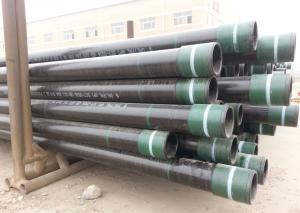API 5CT H40 casing pipe for water well
- Loading Port:
- China Main Port
- Payment Terms:
- TT OR LC
- Min Order Qty:
- -
- Supply Capability:
- -
OKorder Service Pledge
OKorder Financial Service
You Might Also Like
API 5CT H40 Quality Standard
SY/T 6194 -------------Petroleum and natural gas industries Steel pipes for use as casing or tubing for wells
API 5CT----------------CASING AND TUBING
BS EN ISO 11960 ---Petroleum and natural gas industries Steel pipes for use as casing or tubing for wells
NF M87-207 ----------Petroleum and natural gas industries Steel pipes for use as casing or tubing for wells
JIS G3439 ------------SEAMLESS STEEL OIL WELL CASING, TUBING AND DRILL PIPE
IS 4270 ----------------Steel tubes for well spainend casing pipes
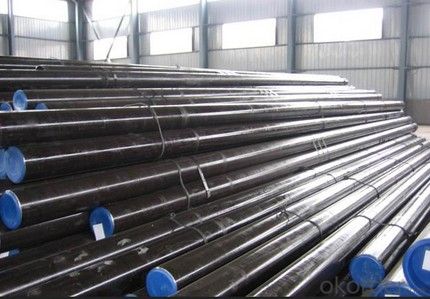
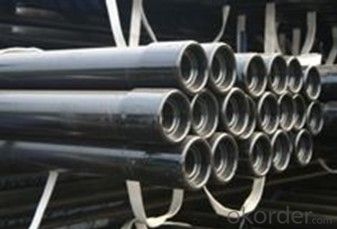
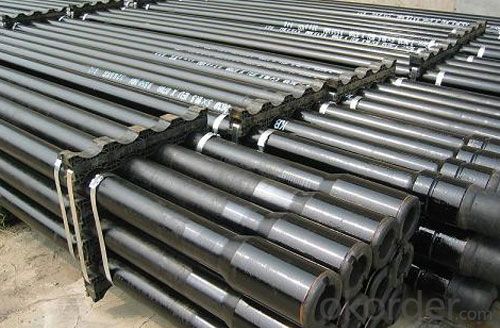
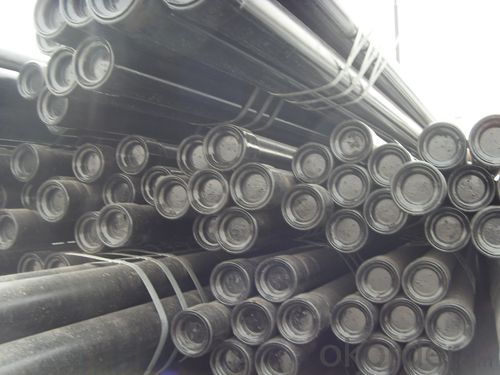
API 5CT H40 casing pipe for water well
Our company produces H40 casing pipe strictly according to the API 5 CT standards.Dalipal Company is one of the most famous enterprises of china professionally producing pipeline and oil casing.We can supply API 5CT series of pipeline and oil casing with all kinds of specifications and materials.We have first-class production equipment and technology.
Main Specification
Grade | API 5CT H40 Casing Pipe for water well |
External thickness | “4 1/2- 20”inch, (114.30- 508.00 mm) |
Wall thickness | 5.21-16.13 mm |
Thread form | BC(buttress casing),LC( long casing),SC( short casing) |
Function | used for protecting pipeline |
Length:
R1-(6.10m~7.32m),R2-(7.62/8.53)~10.36m,R3-(10.36/10.97~14.63m)
Certificate:
API 5CT,Russian Certificate,ISO,CCS
Packing:
Coating and steel thread protector
Usage:
Casing pipes are used for oil , gas and water wells. Steel casing pipes and tubing are applied to furnishing and installing cased tunnels, where they indicate to pass other utilities or obstructions without open excavation. Steel casing pipes and tube have smooth wall and a minimum yield strength of 35,000 psi. Corrosion-proofing water-based paint is applied on the outside pipe surface to protect against atmospheric corrosion during transportation and storage. The pipes can be delivered with metal or composite caps at both ends for thread protection.Casing pipes are manufactured out of steel are smelted in the electric furnace, treated with synthetic slags and cast by continuous casters. The applied steel making process ensures the achievement of chemically pure steel with reference to sulphur and phosphor contents providing high tensile, ductility and corrosion resistance properties of pipes to be operated at low temperatures in various corrosion media. Pipes are heat-treated in a computerized walking beam furnace. Steel grades and heat treatment regimes applied allow high-strength pipe to be obtained.
API Specification 5CT / ISO 11960
Hydrostatic test pressure for Grade H40 tubing
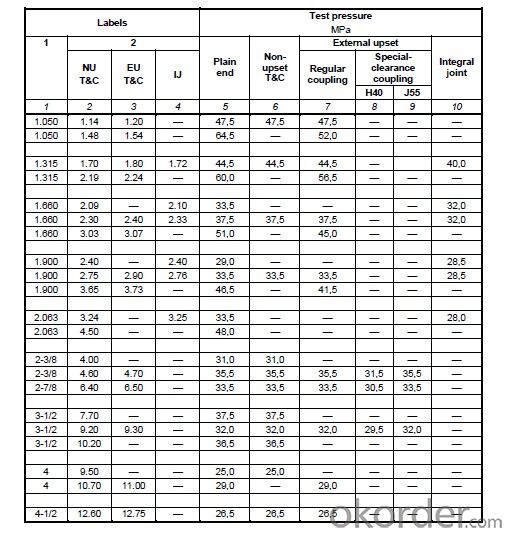
We have the ability to detect the whole process. We can fully guarantee the high quality of the products.
80t electric arc furnace smelting→ LF refining → VD vacuum degassing treatment→4 machine 4 strand machine →slow cooling pit slow cooling → rolling →fine grinding → straightening → heat treatment→ machining →inspection→packaging → warehousing.
Dalipal Company is one of the most famous enterprises of china professionally producing pipeline and oil casing.We can supply API 5CT series of pipeline and oil casing with all kinds of specifications and materials.We have first-class production equipment and technology.
- Q:Are steel pipes suitable for food processing facilities?
- Steel pipes are indeed appropriate for food processing facilities. They are extensively used in the food processing industry because of the multitude of advantages they offer. To begin with, steel pipes are highly durable and can withstand the high temperatures, pressures, and corrosive substances commonly used in food processing. This means that the pipes will not degrade or contaminate the food products. Moreover, steel pipes are easy to clean and maintain, which makes them perfect for upholding the high levels of hygiene required in food processing facilities. Furthermore, steel pipes possess excellent resistance to bacteria growth, thereby ensuring the safety and quality of the food being processed. Additionally, steel pipes are cost-effective and have a long lifespan, making them a dependable and economical choice for food processing facilities. In conclusion, steel pipes are a suitable and preferred option for food processing facilities due to their durability, cleanliness, and resistance to contamination.
- Q:What is the maximum allowable stress for steel pipes?
- The maximum allowable stress for steel pipes depends on various factors such as the grade of steel, diameter, wall thickness, and the intended application. It is typically determined by industry standards and codes, such as the American Society of Mechanical Engineers (ASME) Boiler and Pressure Vessel Code. Therefore, there is no one-size-fits-all answer to this question.
- Q:What are the alternatives to steel pipes for various applications?
- There are several alternatives to steel pipes for various applications. Some common alternatives include pipes made from materials such as plastic (polyvinyl chloride or PVC), copper, cast iron, and ductile iron. Each alternative offers different benefits and drawbacks depending on the specific application, cost, durability, and environmental considerations.
- Q:How do steel pipes compare to other materials in terms of cost?
- Steel pipes are generally more cost-effective compared to other materials due to their durability and longevity. While the initial investment may be higher, their lower maintenance and replacement costs make them a more economical choice in the long run. Additionally, steel pipes can withstand harsh environmental conditions and are less prone to corrosion, reducing the need for frequent repairs or replacements.
- Q:What are the different types of steel pipes available?
- In the market, one can find a variety of steel pipes catering to specific needs in different applications. Some commonly used steel pipes include: 1. Carbon Steel Pipes: These pipes, primarily composed of carbon, are the most prevalent type. They are utilized in a wide range of applications such as fluid and gas transportation, structural purposes, and plumbing. 2. Stainless Steel Pipes: These pipes are manufactured using an alloy that contains a substantial amount of chromium, providing excellent resistance to corrosion. Industries like oil and gas, chemical processing, and food processing rely heavily on stainless steel pipes. 3. Alloy Steel Pipes: These pipes, as the name suggests, consist of an alloy containing a combination of various elements like chromium, molybdenum, and nickel. They offer improved strength, durability, and resistance to high temperatures, making them suitable for applications in power plants, refineries, and petrochemical industries. 4. Galvanized Steel Pipes: To safeguard against corrosion, these pipes are coated with a layer of zinc. Due to their exceptional rust resistance and long-lasting durability, galvanized steel pipes find common usage in plumbing systems, water supply lines, and outdoor structures. 5. Seamless Steel Pipes: These pipes are manufactured without any welded seams and are often preferred for applications requiring high pressure, high temperature, or a smooth inner surface. Industries such as oil and gas, automotive, and aerospace frequently utilize seamless steel pipes. 6. Welded Steel Pipes: These pipes are created by welding two steel pieces together. They are available in various shapes and sizes and commonly used in construction, water supply systems, and general engineering applications. 7. ERW (Electric Resistance Welded) Steel Pipes: These pipes are produced by passing a high-frequency electric current through a steel strip and then welding the edges together. ERW steel pipes find wide usage in oil and gas transportation, structural applications, and fencing. 8. LSAW (Longitudinal Submerged Arc Welded) Steel Pipes: These pipes are formed by bending and welding a steel plate into a cylindrical shape. LSAW steel pipes are commonly employed in large-scale infrastructure projects such as oil and gas pipelines and bridge construction. To summarize, the market offers a variety of steel pipes, including carbon steel, stainless steel, alloy steel, galvanized steel, seamless steel, welded steel, ERW steel, and LSAW steel pipes. The choice of steel pipe type depends on specific application requirements, such as resistance to corrosion, strength, temperature, and pressure resistance.
- Q:Can steel pipes be used for water distribution networks?
- Yes, steel pipes can be used for water distribution networks. Steel pipes are commonly used for water distribution due to their durability, strength, and resistance to corrosion. They can efficiently handle high water pressure and are suitable for both underground and above-ground installations. However, proper protective coatings are necessary to prevent rusting and maintain water quality.
- Q:How do steel pipes handle seismic expansion joints?
- Steel pipes handle seismic expansion joints by allowing for movement and flexibility. These pipes are designed to withstand the forces caused by seismic activity, such as earthquakes, by accommodating expansion and contraction without causing damage to the overall structure. The joints in steel pipes are often equipped with specialized components, such as bellows or flexible couplings, that can absorb the movement and prevent excessive stress on the pipeline. This ensures the integrity and safety of the pipeline system during seismic events.
- Q:What is the difference between steel pipe and copper pipe?
- The main difference between steel pipe and copper pipe lies in their material composition. Steel pipe is made of steel, while copper pipe is made of copper. Steel pipe is stronger and more durable, making it suitable for high-pressure and heavy-duty applications. On the other hand, copper pipe is more malleable and corrosion-resistant, making it ideal for plumbing and water supply systems. Additionally, copper pipe is more expensive than steel pipe but offers better heat conductivity, making it suitable for heating and cooling applications.
- Q:What are the common applications of steel pipes?
- Steel pipes are commonly used in various applications such as water distribution systems, oil and gas pipelines, structural support in buildings and bridges, sewage systems, heating and cooling systems, and industrial processes.
- Q:How do you prevent steel pipes from rusting?
- Various measures can be taken to prevent the rusting of steel pipes. One effective method is the application of a protective coating on the surface of the pipes. Different types of coatings, such as paint, epoxy, or zinc, can be used for this purpose. These coatings act as a barrier between the steel and the corrosive environment, thereby preventing direct contact between moisture, oxygen, and the metal, which can lead to rust formation. Another approach involves the use of corrosion inhibitors. These substances are added to the water or fluid flowing through the pipes, creating a protective film on the surface of the steel. This film acts as a shield, inhibiting the corrosion process and preventing the formation of rust. Regular maintenance plays a crucial role in preventing rust on steel pipes. It is essential to inspect the pipes regularly for any signs of damage or corrosion and promptly repair or replace any compromised areas. Additionally, keeping the pipes clean and dry by removing accumulated dirt or moisture helps prevent the formation of rust. In some cases, using stainless steel pipes instead of regular steel can be beneficial. Stainless steel contains chromium, which forms a passive oxide layer on the metal's surface. This layer acts as a natural barrier against corrosion, making stainless steel pipes highly resistant to rust. Finally, controlling the installation environment of the pipes can also help prevent rust. This can be achieved by maintaining proper ventilation, controlling humidity levels, and avoiding exposure to harsh chemicals or corrosive substances. By implementing these preventive measures, the lifespan and integrity of steel pipes can be significantly extended, while minimizing the risk of rust formation.
1. Manufacturer Overview |
|
|---|---|
| Location | |
| Year Established | |
| Annual Output Value | |
| Main Markets | |
| Company Certifications | |
2. Manufacturer Certificates |
|
|---|---|
| a) Certification Name | |
| Range | |
| Reference | |
| Validity Period | |
3. Manufacturer Capability |
|
|---|---|
| a)Trade Capacity | |
| Nearest Port | |
| Export Percentage | |
| No.of Employees in Trade Department | |
| Language Spoken: | |
| b)Factory Information | |
| Factory Size: | |
| No. of Production Lines | |
| Contract Manufacturing | |
| Product Price Range | |
Send your message to us
API 5CT H40 casing pipe for water well
- Loading Port:
- China Main Port
- Payment Terms:
- TT OR LC
- Min Order Qty:
- -
- Supply Capability:
- -
OKorder Service Pledge
OKorder Financial Service
Similar products
New products
Hot products
Related keywords
